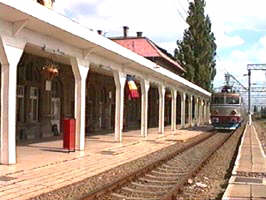Around the turn of the century, a prosperous farming strategy had been developed but at the same time many families, because of their large number of children, became dependent on the medium- and larger-sized farms for work. To overcome their needs, around 200 families emigrated between 1904 and 1914 to the USA (eg to Chicago, Portland, North Dakota and Pennsylvania). During the period 1923 - 35 a further 120 families moved to the USA, Canada, Brazil, Paraguay, Uruguay etc.
During the First World War, around 200 men, of which 59 were killed in action, joined the military service. In the Second World War there were 382 men (280 in the German army, 102 in the Romanian army). At the end of this war, 130 soldiers failed to return (fallen or missing). Of those still alive from the German army, only 87 men returned to Neupanat; the remainder stayed in Germany, Austria, France, England and East Germany, or put their roots down overseas (USA and Canada).
A further 200 Neupanat countrymen fled from the approaching Soviet army on 20th September 1944 to Western Europe. They settled in Austria, Germany, USA and Canada, as well as other countries.
But by far the most terrible event for the German population of Neupanat happened on 14th January 1945, when 284 men and women were forcibly taken to the Soviet Union to work as slaves in the labour camps. There, they had to endure 5 years under extreme conditions, rebuilding the country. During this period 33 countrymen died of hunger, cold, sickness, a sense of hopelessness, homesickness for their families, children, parents and homeland. On the journey back via Frankfurt/Oder, several of the deportees, especially the sick, stayed in the then Soviet occupied zone where they looked to join other fellow countrymen who were already living in the West.
A fundamental change for Neupanat came in the Autumn of 1944 with the settlement of Romanian colonists in the formerly pure German community (only the cowherds and knackers had been Romanian inhabitants up until 1944). In 1948 there were 486 Romanians and only 1240 Germans living in Neupanat.
The beginning of the full dispossession of the German population in March 1945 meant a serious threat to the basic way of life for those who had stayed behind. This is shown by the following table:
From 1945 to 1948 the following property was taken from the Neupanaters:
The ensuing situation led to an uprooting of the villagers' farming community and native soil. In 1952, with the land taken from the Germans, the Agricultural Production Co-operative (LPG) "G.A.C. Horia, Closca si Crisan" (later renamed "Viitorul") was founded. When this was set up, it was predominantly former German farmers who had to join the LPG. Only later did the Romanians join the "collective", as the LPG was known in Neupanat.
Not only the economic situation, but also the political deprivation of rights and discrimination against Germans under the Romanian-Communist dictatorship led to the Germans leaving, i.e. emigrating to Germany. Within the framework of families leading the way together, the first of these families began to leave for Germany already in 1950.

The pressure to emigrate grew so strong that in 1977 a clear breaking-up process of Neupanats German community set in. In 1982 and 1983 the flow of emigrants reached a high with over 500 people leaving Neupanat. For those who stayed behind the feeling of becoming more and more isolated in their own homes set in.
In 1990, after the political revolution in Romania, even the last few Germans had lost their trust in the power of the State and they finally turned their backs on their old homeland. During this time, a further 213 people from Neupanat arrived in the recently reunited Germany.
In 1975 there were still 1550 Germans (and 860 Romanians) living in Neupanat - nearly all were Roman Catholic - today, 213 years after the foundation of the parish, there are only 30 Germans left out of a total population of around 2300.
The Neupanaters got together in Germany in 1985 and within the framework of the Banat Swabians they formed a native country community (HOG). They meet annually on a pilgrimage to Deggingen, and on the Church Consecration Feast Day in Rastatt. The few natives who still live in the old homeland today are supported by the HOG. The HOG also looks after the cemetery and the church in Neupanat.
In August 2000, the Neupanat HOG organised a jubilee fete in the old homeland. Around 250 Neupanaters came along, mainly from Germany, but also from Austria, the USA and Canada, to celebrate the consecration of the church 175 years ago. This will probably have been the last time that so many Neupanaters will have been able to celebrate such a reunion in the old homeland.
For 213 years the bells of our native church have rung out three times every day.